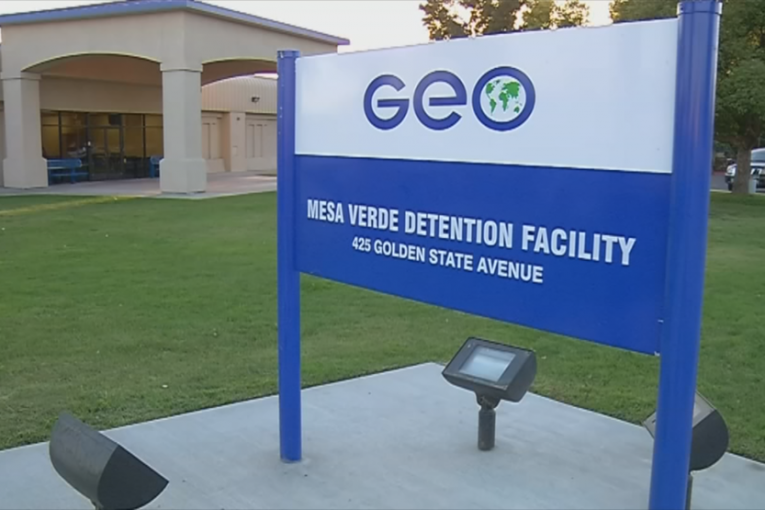
 By Josue Monroy
By Josue Monroy
This report is written by the Covid In-Custody Project — an independent journalism project that partners with the Davis Vanguard to bring reporting on the pandemic in California’s county jails and Department of Corrections and Rehabilitation (CDCR) to the public eye. Visit our website to view and download raw data on cases, testing, releases and vaccinations.
ICE continues to battle oversight after its mismanagement of detainment centers at Yuba County and Mesa Verde led to preventable outbreaks of Covid-19 since the pandemic began earlier this year. ICE officers and privately-contracted administration officials testified in U.S. District Court last week in San Francisco in an attempt by their legal team to have an emergency order lifted that required them to comply with testing and social distancing regulations.
The legal battle began in April 2020, when a class action lawsuit was brought against ICE and GEO Group, a private contractor that administers detention facilities. The suit challenged conditions at the two facilities, and contended that detainees are exposed to unreasonable risk of infection. Subsequently, multiple injunctions have been filed due to ICE’s lack of cooperation and action regarding population reduction, intake practices, distancing practices, isolation practices, and testing.
After being required to test all detainees in August, half of Mesa Verde’s 104 detainees tested positive for Covid-19.
Now, ICE is petitioning Judge Vincent Chhabria to lift the injunctions imposed on the facilities forcing them to comply with social distancing, mass testing and intake guidelines. These guidelines were not voluntarily implemented by facility administrators. ICE officers and GEO Group personnel testified in court for five days between Nov. 16 and Nov. 20 to make the case that they were now willing and capable to handle pandemic protocols without a court order.
ICE officer Alexander Pham, who was the official overseeing Mesa Verde, testified early in the week and was grilled by the plaintiffs’ legal team about his misleading statements during an interview in June regarding the detainee intake process. At the time, Pham admitted in a written statement that he had misrepresented the facility’s intake protocols, and that there in fact were none in place to isolate individuals being transferred from known Covid-stricken facilities. Pham answered all questions at the hearing with “I don’t recall,” effectively refusing to cooperate.
The most shocking evidence of ICE’s alleged negligence emerged on the third day of testimony, when ICE Deputy Field Office Directors Erik Bonnar and Moises Becerra testified before the court. During his testimony, Bonnar was forced to admit that ICE had no contingency plan for an outbreak at Mesa Verde. In fact, they had not committed to any potential determent practices in official correspondences, but had only mentioned them in conversation. As required by Judge Chhabria’s April injunction, the facilities in question would have to reduce the detainee population significantly.
In an April 24 declaration, Bonnar did not confirm that Mesa Verde was in the process of clearing out the women’s dorm; the dorm housed around 80 women at that time and would ostensibly be an easily achievable feat. When pressed on the matter in court, Bonnar admitted that there was never a concrete plan to reduce intake or transfer after the nationwide lockdown, but rather, informal conversations to arrive at a plan. There were no email conversations regarding the women’s dorms or any other contingency efforts.
For testimony about the architectural plan of the Mesa Verde facility, and the center’s ability to provide adequate quarantining and social distancing, the court called Nathan Allen. Allen is the facility administrator for GEO Group, and is familiar with the layout at Mesa Verde. Allen stated that the center is currently at limited capacity, only housing 45 detainees of the 400-person maximum. Three dorms, which hold 100 people each, are designated for the general population, and one dorm has been set aside for those that tested positive for Covid-19, according to Allen. He assures that the facility is capable of handling future outbreaks.
This claim is in contrast to testimony earlier in the week by Dr. Robert Greifinger, a correctional healthcare consultant with experience in the New York state prison system, who stated that Mesa Verde is “structurally deficient in the context of Covid-19.” Greifinger explained that there was only a four-foot diagonal distance between the bunks in the dorms, and not the required six feet. He also made clear that the center needs to have the ability to isolate positive cases, something that seems improbable. This is due to the fact that, according to testimony from ICE officer Alexander  Pham, all medical isolation and restrictive housing units are currently occupied.
Pham, all medical isolation and restrictive housing units are currently occupied.
During the last day of witness testimony, Allen was asked to explain why he mixed the populations of two of the dorms against the advice of Mesa Verde’s detainee medical provider. He alleged that the staff were looking for the “best option in the worst situation.” This could indicate that there was no adequate facility space to house infected detainees, as is alluded by the fact that some of those housed in the merged dorms were showing Covid-19 symptoms. This point is reiterated when Allen admits that he had “no outbreak plan at all” after being questioned in court. This is telling, considering he is the facility administrator.
Dr. Richard Medrano was called to the stand for the final testimony of the week. He is the Regional Medical Director for Wellpath, Mesa Verde’s corporate healthcare provider. Judge Chhabria asked him the question that the entire hearing hinged on: “What is the plan for Mesa Verde to operate in the event that there is no court order?”
Medrano stated that he had proposed to GEO Group that they test 20 percent of the population going forward, rather than every single individual. When asked if this was a proposal or if the plan already existed, Medrano stated that they had discussed it, but it had not been finalized. He did say, however, that there would be a designated dorm for quarantine. When questioned by one of the plaintiffs’, Medrano revealed that the quarantine dorm was not part of the written plan, which is a major concern.
In light of that, the plaintiffs’ proposed injunction, which would replace the expiring one and continue to hold ICE accountable, would make prescriptions as to situations regarding detainees. These include positive and symptomatic cases, those refusing testing, new intakes, and the general population.
On December 3, Judge Chhabria granted a second preliminary injunction as a result of the hearings. The order requires Mesa Verde to maintain a designated dorm for infected individuals, which is to remain empty and available if there are no cases. It also mandates that all new intakes be pre-screened for Covid-19 and that those testing negative be quarantined for 14 days. Saturation testing will continue, with all staff and detainees being tested on a weekly basis. Transfers out of the facility of detainees will not continue, barring a medical emergency, or any other emergency. The facility will also be required to report any new positive case to the Court and to the plaintiffs’ counsel, no later than the day staff learns of it.
The injunction granted part, not all, of what the plaintiffs’ counsel proposed as part of a new order, but Judge Chhabria agrees with their assertion that Mesa Verde cannot be left to their own devices in dealing with the current health crisis. This injunction, and the previous one granted earlier this year, will remain in effect while the case is pending.
 Josue Monroy is a 4th year International Relations major at UC Davis. Hailing from Santa Cruz, CA, his interests include Latin American literature and politics, as well as playing music in his spare time
Josue Monroy is a 4th year International Relations major at UC Davis. Hailing from Santa Cruz, CA, his interests include Latin American literature and politics, as well as playing music in his spare time




